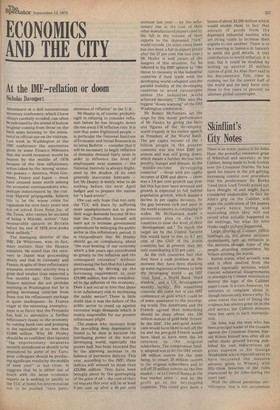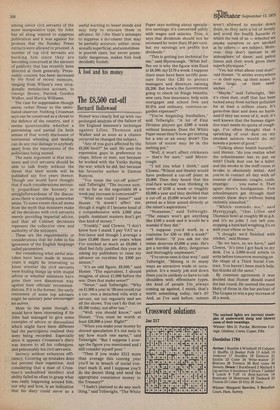Skinflint's City Notes
There is an ironic justice in Sir-John Hunt, the powerful eminence grise of Whitehall and secretary to the Cabinet, being made to look foolish over the Crossman Diaries. He has spent his tenure in the job getting increasing control over procedure that his predecessor Sir Burke Trend (now Lord Trend) would not have thought of and might have considered undesirable. In fact Sir John's grip on the Cabinet will make the publication of the papers 30 years hence boring and misleading since they will not record what actually happened in the meetings, but what Sir John thinks oughtrtp-lhay,c happened.
Large ,mn)f.pii9f, Cabinet Office
briefings. ;tie .,j,prime minister mysteribtqlyuttqn up, verbatim in the ,minutest.though none of the people attending remembers Mr Wilson uttering the words.
Rather worse, what actually was said is often omitted from the record, especially sections which contain substantial disagreements or attempts by Cabinet ministers to destroy the logic of the Cabinet paper's case. It is rare, however, for ministers to complain about it, though heaven only knows why. To some extent this sort of fixing the evidence has always gone on in the civil service, but Cabinet minutes were less open to such manipulation.
Sir John was the man who has been principal leader of the crusade against the Crossman diaries. Harold Wilson himself was after all on rather shaky ground haying published his own indiscretions (at great expense to Sir George Weidenfeld who is reputed never to have, recovered the massive advance given to Wilson), with fifty-three breaches of the rules enunciated by Sir John during the court case.
With the almost paranoiac secretiveness that is not uncommon
among senior civil servants of the more manipulative type, Sir John has all along wanted to suppress publication and it was against his protests that the Sunday Times extracts were allowed to proceed. A number of top civil servants are backing him since they are becoming concerned at the amount of publicity that has recently been directed at them generally. Presumably concern has been increased by the flood of recent memoirs, ranging from Wilson's own occasionally mendacious account, to George Brown, Patrick Gordon Walker, and Marcia Williams.
The case for suppression though seems rather flimsy to the uninitiated observer. Nothing Crossman says can be construed as a threat to the defence of the country, and it seems questionable whether a patronising and partial (in both senses of that word) disclosure of ministerial wheeling and dealing can do any real damage to anybody apart from the reputations of the politicians being named.
The main argument is that ministers and civil servants should be able to talk freely without the threat that their words will be published say five years thence. Though one would have thought that if such considerations seriously jeopardised the honesty or straightforwardness of the discussions there is something somewhat amiss. To some extent this all stems from the myth that ministers make all the decisions with civil servants merely providing impartial advice, and that all Cabinet decisions represent the collective view and authority of the ministers.
These are the requirements or considerations that Sir John in his ignorance of the English language called parameters.
But considering what awful mistakes have been made in recent years it might be interesting to know whether the civil servants were fouling things up with stupid advice or whether ministers have gone their own disastrous way against their officials' recommendations. If it is the former, the early retirement of some top advisers might be salutary pour encourager fes autres.
More to the point though, it would have been interesting if Sir John had managed to give some examples of advice or discussiOnswhich might have been different had the participants realised they were being recorded. Especially since it appears Crossman's diary was known to all his colleagues, and presumably his civil servants.
Secrecy seldom enhances efficiency. Covering up mistakes does not prevent their repetition. And considering that a man of Crossman's undoubted intellect and ability failed so often to grasp what was really happening around him, nor why and how, is an indication that his diary could serve as a useful warning to lesser minds and may help to educate them in advance. Sir John Hunt's attempts to suppress a document that may be partially accurate, unfair, occasionally superficial, and sometimes in poorish taste, but never potentially dangerous, makes him look decidedly foolish.



































 Previous page
Previous page